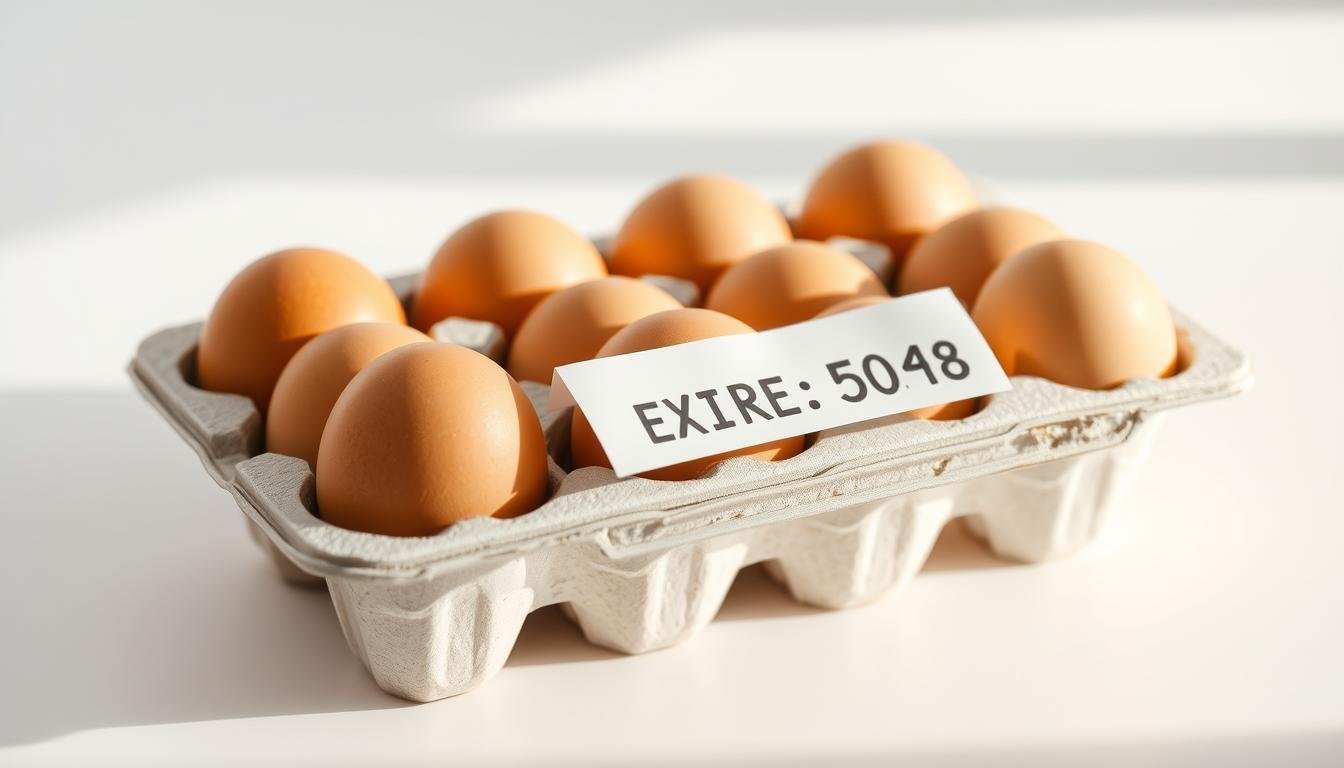Last updated on December 11th, 2025 at 02:15 pm
Can You Eat Eggs 2 Days After Expiration? Ever thought about eating eggs after their expiration date? It’s a valid concern, as spoiled eggs can pose health risks. Knowing about egg expiration dates is key to choosing safe food.
The date on an egg carton is a freshness guide, not a hard limit for safety. Storage and handling also affect how fresh eggs stay. [Can You Eat Eggs 2 Days After Expiration?]
We’ll look into checking egg freshness, the right storage, and the dangers of bad eggs. This will help you decide on the eggs in your fridge.
Contents
- 1 Understanding Egg Expiration Dates
- 2 Can You Eat Eggs Two Days After Expiration Date?
- 3 Factors Affecting Egg Freshness
- 4 How to Test if Eggs Are Still Fresh
- 5 Proper Egg Storage for Maximum Freshness
- 6 Health Risks of Consuming Spoiled Eggs
- 7 Egg Safety Made Simple
- 8 FAQ: Can You Eat Eggs 2 Days After Expiration?
- 8.1 What do egg expiration dates signify?
- 8.2 How can you test if eggs are still fresh?
- 8.3 What is the water test for egg freshness?
- 8.4 How should you store eggs to keep them fresh?
- 8.5 Can you eat eggs that have been refrigerated and then left at room temperature?
- 8.6 What are the health risks of consuming spoiled eggs?
- 8.7 How can you minimize the risk of getting sick from eggs?
Understanding Egg Expiration Dates
Egg cartons often have a date labeled as ‘sell by,’ ‘use by,’ or ‘expiration date.’ But what do these dates really mean? Knowing these dates is key to making sure you eat eggs that are safe and of good quality.
The ‘sell by’ date is for stores, showing how long they should sell the eggs. It’s not about safety but helps with managing stock. The ‘use by’ date is for you, telling when the eggs are at their best. The ‘expiration date’ or ‘egg safety date’ is less common but means the eggs are safe to eat until that day.
It’s essential to know these dates don’t always mean an egg is safe or fresh. How eggs are stored is very important for keeping them good. Eggs stored right can stay safe and fresh even after these dates.
To get the most from your eggs, store them right and check their freshness often. Knowing about egg expiration dates is just the start to enjoying safe and quality eggs.
Can You Eat Eggs Two Days After Expiration Date?
Wondering if it’s safe to eat eggs two days after their expiration date? It depends on a few things. These include how the eggs were stored and what they look like when you check them.
Eggs stay fresh longer if kept in the fridge at a cool temperature. The expiration date is a guide for stores. It helps them sell eggs before they might spoil. [Can You Eat Eggs 2 Days After Expiration?]
To see if eggs are still good, do a simple test. Look for any signs of spoilage like cracks or a bad smell. Fresh eggs have a clean shell. When you crack them open, the egg white should be clear, and the yolk firm and round. [Can You Eat Eggs 2 Days After Expiration?]
Factors Affecting Egg Freshness
| Storage Condition | Effect on Freshness |
|---|---|
| Refrigerated at 40°F (4°C) or below | Remains fresh for longer |
| Stored at room temperature | Goes bad quicker |
| Handled roughly | May crack and spoil |
If your eggs are a couple of days past their expiration date and were stored right, they’re probably okay. Just make sure they pass the freshness test. But, if you’re not sure, it’s safer to throw them away. This way, you avoid any health risks.
How to Test if Eggs Are Still Fresh
There are easy ways to check if eggs are fresh. It’s important to make sure your eggs are fresh for the best taste and safety.
Checking the Yolk and White
Cracking an egg open is a simple way to check its freshness. Fresh eggs have a firm, round yolk and a clear, thick white. As eggs get older, the yolk flattens and the white becomes runnier.
A fresh egg will have a distinct, clean smell. If an egg smells sour or very strong, it’s probably bad. [Can You Eat Eggs 2 Days After Expiration?]
Shell Examination
Looking at the shell before cracking can also tell you about the egg’s freshness. Fresh eggs have clean, dry shells. Stay away from eggs with visible cracks or dirt, as they might be contaminated.
Try the water test too. Put a cold bowl of water and gently place the egg in it. Fresh eggs will sink and lie flat. If it stands up or floats, it might be old or spoiled.
Using these methods, you can easily check your eggs at home. Checking eggs regularly helps you use them at their best. This improves your cooking and baking.
Proper Egg Storage for Maximum Freshness
To keep your eggs fresh, it’s key to store them right. The way you store them can really impact their quality and safety. [Can You Eat Eggs 2 Days After Expiration?]
Whole Eggs
Whole eggs need to be kept in the fridge at a cool temperature below 40°F (4°C). It’s smart to keep them in their original carton to avoid moisture loss and contamination. Place them in the main fridge area, not on the door, for a steady temperature.
Cracked Eggs
If an egg gets cracked, it’s important to store it right to keep it fresh. You can put cracked eggs in an airtight container or a sealed glass jar. Store them in the fridge and use them within a day or two. [Can You Eat Eggs 2 Days After Expiration?]
Cooked Eggs
Cooked eggs need to cool down fast and then go in the fridge within an hour. Store them in a covered container to stop drying out and contamination. Use cooked eggs within 3 to 5 days.

| Egg Type | Storage Method | Storage Duration |
|---|---|---|
| Whole Eggs | Refrigerate in original carton | Until expiration date or 5 weeks |
| Cracked Eggs | Airtight container in refrigerator | 1-2 days |
| Cooked Eggs | Covered container in refrigerator | 3-5 days |
By following these storage tips, you can enjoy fresh and safe eggs for longer. Proper storage is a simple yet effective way to keep your eggs in top condition.
Health Risks of Consuming Spoiled Eggs
Spoiled eggs are not just a nuisance; they can be a serious health hazard. When you eat eggs that have gone bad, you risk salmonella poisoning.
Salmonella is a type of bacteria that can cause food poisoning. Symptoms include diarrhea, fever, and stomach cramps. It can also lead to vomiting. In severe cases, it can cause serious health issues, especially in the elderly, young children, and those with weak immune systems.
To avoid getting sick from eggs, handle and store them right. Always check the expiration date and store them in the fridge at 40°F (4°C) or below. Cooking eggs well until the yolks are firm and whites are set is also key.
If you think your eggs are bad, it’s safer to throw them away. You can test eggs by placing them in a bowl of water. If it sinks and lies flat, it’s fresh. But if it stands up or floats, it’s likely spoiled.
Knowing the risks of spoiled eggs and taking steps to prevent them can help you enjoy eggs safely. This way, you can minimize the risk of getting sick from foodborne illness. [Can You Eat Eggs 2 Days After Expiration?]
Egg Safety Made Simple
Knowing about egg expiration dates and how to handle eggs safely is key to staying healthy. You’ve learned that the expiration date isn’t the only thing that matters. Regular checks and proper storage help you enjoy eggs safely.
Being informed is crucial for egg safety. Eggs can be good for two days after their expiration date if stored right and pass a freshness test. Always look for signs of spoilage and use the water test to check if an egg is fresh.
By following these simple steps, you can keep your kitchen safe from egg-related health risks. Proper handling and storage of eggs prevent the dangers of spoiled eggs. Stay safe and enjoy your eggs.
See Also: Can You Eat Sour Cream After Expiration Date?
FAQ: Can You Eat Eggs 2 Days After Expiration?
What do egg expiration dates signify?
Egg expiration dates, like “Sell By,” “Use By,” or “Expiration Date,” show the last day to sell or eat eggs. This ensures they are at their best quality and freshness. [Can You Eat Eggs 2 Days After Expiration?]
How can you test if eggs are still fresh?
To check if eggs are fresh, you can do the water test. Look at the yolk and white for any odd looks or feel. Also, check the shell for cracks or sliminess.
What is the water test for egg freshness?
The water test is simple. Place the egg in cold water. If it sinks and lies flat, it’s fresh. If it stands up or floats, it might be old or bad.
How should you store eggs to keep them fresh?
Store whole eggs in their carton in the fridge at a cool temperature below 40°F (4°C). Keep them away from foods with strong smells, as eggs can pick up odors.
Can you eat eggs that have been refrigerated and then left at room temperature?
It’s not safe to eat eggs left at room temperature for too long. Bacteria can grow. Always refrigerate eggs quickly after buying and keep them cold. [Can You Eat Eggs 2 Days After Expiration?]
What are the health risks of consuming spoiled eggs?
Eating bad eggs can cause salmonella poisoning. This can lead to diarrhea, stomach pain, fever, and vomiting. It can be very serious, especially for the elderly, young kids, and those with weak immune systems.
How can you minimize the risk of getting sick from eggs?
To lower the risk, always check eggs for signs of spoilage before eating. Store them right, handle them safely, and cook them well. Don’t eat raw or undercooked eggs. [Can You Eat Eggs 2 Days After Expiration?]

Hello, I am Bellamy George, a certified nutritionist and food safety specialist from Springfield, IL. With a degree in Food Science, I share research-backed insights on edible foods, seeds, and seafood for safe, informed eating.

